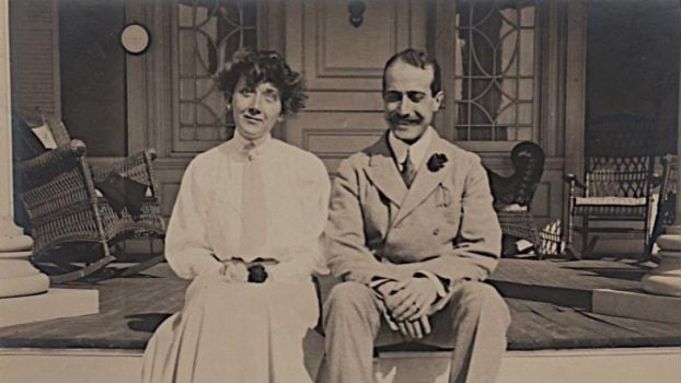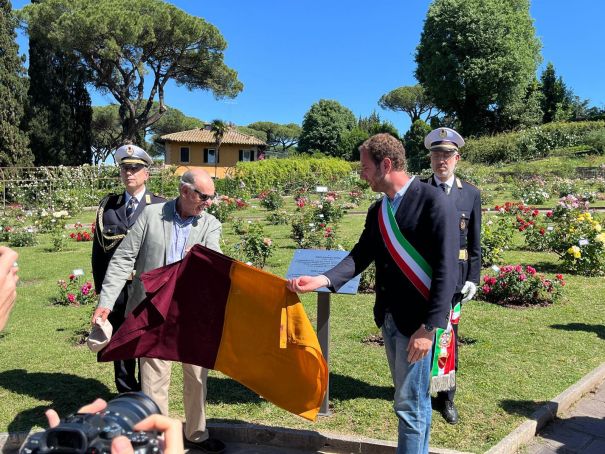Rome remembers American founder of Roseto Comunale.
Rome has paid tribute to Mary Gayley Senni, the American founder of the city's rose garden, with a plaque at the Roseto Comunale on the slopes of the Aventine hill.
The unveiling ceremony on Friday was attended by city officials and the grandchildren of the garden's founder who was born in Pittsburgh, Pennsylvania, in 1884.
Mary, whose father James Gayley made his fortune in the US steel industry, arrived in Rome aged 18 on a Grand Tour of Italy with her mother and sister.
During her time in Rome, Mary met an Italian count, Giulio Senni, who she would describe as her "one true love".
After their wedding in New York in 1907, the couple began their married life in Rome before moving to the Senni family estate in Grottaferrata, about 20 km south-east of the capital.

It was at Villa Senni that the new countess developed her love of gardening, with a particular passion for roses and irises.
Mary and her husband, who had seven children together, were avid travellers and made frequent trips to the US and Europe.
A visit to the Parc de Bagatelle in Paris had a profound effect on Mary who decided that Rome should have its own rose garden.
In 1924 she presented Rome with its first collection of roses, cultivated at her garden in Grottaferrata, Corriere della Sera reports.
However she was unimpressed with the city's chosen location to plant them - in the Pincio corner of Villa Borghese - and requested that her beloved roses be returned to her.
Eight years later, in 1932, Mary had better luck with the then governor of Rome, Prince Francesco Boncompagni Ludovisi, and a rose garden was created on the Oppian hill near the Colosseum.

Mary also established the prestigious Premio Roma, the annual international competition, which is held every May, to judge the most beautiful rose in the capital.
The rose garden on the Colle Oppio was destroyed during world war two but in 1950 the roses bloomed once more at the garden’s present site on the Aventine hill, where the Jewish cemetery had been located from 1645 until being transferred to Campo Verano in 1934.
During the war, the 10,000-sqm site overlooking the Circus Maximus had been transformed into a vegetable garden before remaining uncultivated until 1950.
The city's Jewish community agreed to the creation of the rose garden at the once sacred location but stipulated that a stele be placed at each of the two entrances and that the paths be designed in the shape of the Menorah, the traditional seven-branched Jewish candelabrum.
Mary Gayley Senni died in Rome on 14 March 1971 at the age of 87. She is buried at the Prima Porta cemetery, together with her husband Giulio who died in 1949.
Enjoying the spring blooms in Rome’s rose garden on the slopes of the Aventine Hill. pic.twitter.com/PiGFSxdeBt
— Wanted in Rome (@wantedinrome) May 4, 2024
Serendipitously, in 2010, American author and Fulbright scholar Margaret Brucia was browsing through a collection of old handwritten letters at the Porta Portese flea market in Rome.
She bought a handful of the letters, with the intention of cutting them up to make a collage, and took them home. However before picking up a scissors she decided to read one of them.
The letter began: “Last night we had Albert Einstein for dinner...”.
Brucia immediately abandoned any idea of cutting the letters and the following Sunday she returned to the same stall at Porta Portese where she purchased dozens of other letters from the same collection.
The letters, more than 100 in total, were written between 1902 and 1937 by Mary's mother, a New York socialite named Julie Gardiner.
Brucia made contact with Mary's family and soon came into possession of another stash of 100 letters written from Mary to her mother, which had recently been discovered by chance in an attic in Maine.
All of a sudden Brucia had the entire exchange of letters between Mary and her mother, and her research led her gradually to Mary's grandchildren in New York, Maine and Rome.

"I never met Mary, but by chance I have come to know her intimately", Brucia said during the plaque unveiling ceremony last week at the Roseto Comunale, where she was joined by Mary's grandchildren.
Mary Gayley Senni is remembered at the rose garden she founded almost a century ago as an "enterprising spirit and lover of flowers to which she dedicated her entire life".
The Roseto Comunale, which hosts about 1,200 varieties of roses, can be visited for free every day, from 08.30 to 19.30, until 16 June.
Cover photo: Roseto Comunale: Boris-B / Shutterstock.com.
General Info
View on Map
Rome's rose garden celebrates its founder Mary Gayley Senni
VFMM+X9, 00185 Rome, Metropolitan City of Rome Capital, Italy

















